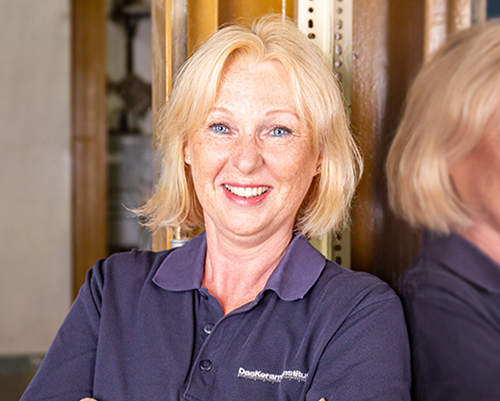
Developing and enhancing ceramic materials, products and technologies
By making use of production modelling tests focussed on your ceramic technologies, the Keramikinstitut can assist in answering questions about your production system. Our pilot plant enables us to simulate real production flows of all important ceramic technologies with all important ceramic materials on a smaller scale. With our help, you can develop the best-performing and most efficient ceramic materials, and choose the best technologies to process them. All research is done by specialists in applied research, with years of experience in ceramic materials and technologies.
Practical research
- Assessment of existing masses
- Substitution of raw material components
- Optimization of mass composition
- Processing of optimized technologies
- Production of lines of samples in a pilot plant
Possible ceramic materials
- porcelain (hard.-, sanitary-, electrical-)
- stoneware, vitreous china
- earthenware
- heavy ceramics
- refractories
- alumina ceramics
- zirconium oxide ceramics
- zinc oxide ceramics
- titanium oxide ceramics
- steatite-, mullite- und cordierite bodies
Available technical equipment (selection)
| comminution | jaw breaker, fine roller mill, tumbling mills, disc vibrating mill (WC), disc mill, pin crusher mill, ball mills, annular passage mill |
|---|---|
| mixing | Eirich-mixer, 5 to 400 litre; double shaft mixer, 5 to 70 litre |
| granulation | spray dryer ZT 50 |
| plastification | different Eirich-mixer (5l…400l), kneader 20l (Co. Linde) |
| dry pressing | uniaxial press (160 t), isostatic press (max. 1.700 bar) |
| extrusion | vacuum extrusion presses (Co. Netzsch, Händle, Kema), piston extrusion pressKolbenpresse |
| casting | manual- and pressure casting (equipment DG 80, Co. Dorst) |
| drying | clime dryer (Co. Weiss), a lot of lab dryers |
| sintering | box kilns (gas, until 1.600°C), high speed kiln for tiles (electr.), gradient kiln (electr.), different muffle kilns (electr., until 1.750 ° |
| other equipment | autoclave (up to 40 bar), magnetic separator ERIEZ (wet and dry separation), box filter press |
Prototyping high-performance ceramics
For developing high-performance ceramics, the Keramikinstitut offers a package of special supplies focussed on real production flow. Developing components and preparing serial production processes for them is part of our service.
Service offer advanced ceramics
- Processing of components for special applications
- Processing of technology for producing components
- Tests of production technology on a pilot plant scale
- Production of prototypes and small serieses on a pilot plant scale
- Introduction to large scale production
Supply of advanced ceramics (according to DIN EN 60672)
- alumina porcelain (C 120, C 130)
- steatite (C 220)
- titanium oxide (C 330)
- cordierite ceramics (C 410, C 520)
- mullite ceramics (C 620)
- alumina (C 780, C 786, C 795, C 799)
- zirkonium oxide (psz)
- yttrium oxide
Available equipment for advanced ceramics
| mixing | Eirich-mixer R05 T, R14 D |
|---|---|
| granulation | spray dryer ZT 50 |
| plastification | Eirich-mixer, kneader 20l (Co. Linde) |
| dry pressing | 160t-press (Co. Raster), isostatic press (max. 1700 bar) |
| extruding | vacuum extrusion press PVZQRG 8a (pressure max. 100bar, Co. Händle) |
| casting | manual- or pressure casting (DG 80, Co. Dorst) |
| drying | Climate dryer (Co. Weiss) |
| sintering | box kilns until 1700°C |
SCR-catalysts designed for flue-gas cleaning (flue-gas denitrification)
The Keramik-Institut offers the material-based and technological development of monolithic SCR-catalysts for flue gas cleaning (diesel passenger cars) including flue-gas denitrification (power plants, biogas, waste incineration).
The illustration shows the sample workpiece of a SCR-catalyst with a cross-section of 50x50 mm and a cell density of 400channels per square inch (cpsi) produced in the Keramik-Institut and for usage in a diesel-powered truck.

The Keramik-Institut concentrates on the development of ceramic honeycomb bodies including not only complete catalysts but also substrates (supporting honeycombs) for coated catalysts. This includes the following technological steps:
- Mass preparationand production of a mouldable mass by means of an intensive mixer and a double shaft kneader
- Impregnation of powdery support material with a catalytically active substance from a solution or subsequent coating of the fired honeycomb
- Production of honeycombs (e.g. 50 x 50 mm, other sizes possible) with cell densities ranging from 10 until 400 cpsi (= channel per square inch)
- Drying and firing of honeycombs
The extensive characterization and optimization of honeycomb bodies is based on the analytical methods mentioned below:
- Ceramic-technological characterization
- Chemical and physical characterization
- Determination of catalytic activity regarding different gas compositions and flow rates
The following honeycomb materials can be offered:
- Titanium dioxide (anatase, with or withouttungsten trioxide stabilization)
- Aluminium oxide
- Cordierite
- Other materials are possible
If requested, we will also support you regarding the planning, the starting as well as the optimization of a production line regarding our SCR-catalysts.
Implementing and Optimizing Plants
Wherever you are, the Keramikinstitut´s applied research experts offer a wide range of our services on-site at your facility. They can commission the production operation of your plant, or help to modernise it. We offer our services for all kinds of plants and for all kinds of ceramic products, such as bricks, roofing tiles, or fine ceramics.
Managed equipment
- extruder
- pressure casting machines
- dryer
- kilns


